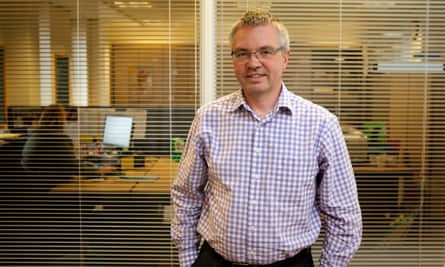More than 50 football clubs have now been named in allegations passed to police investigating child sex abuse, as the scandal continues to engulf the sport.
Child protection sources within Operation Hydrant, the national police body coordinating historical sex abuse claims, have told the Observer that 55 professional and non-league clubs have so far been cited by players claiming they were abused.
“We can confirm that 55 clubs in total have been referenced,” said a source at the National Police Chiefs’ Council, which coordinates Hydrant.
Meanwhile, the NSPCC said it had received calls to its football abuse hotline alleging cases of continuing abuse, raising the risk that some children might currently be in danger.
“We have had a few bits of information, allegations where children might be at risk now,” said John Cameron, the charity’s head of helplines.
The development followed claims on Saturday that a former employee of Southampton football club accused of sexually abusing young players in the 1980s is still working in the sport.
Chelsea, currently top of the Premier League, were forced to issue a statement following claims that the club insisted on a confidentiality clause in a settlement with an ex-player who said he had been sexually abused by a former chief scout at the club.
Gary Johnson revealed that last year he had signed the confidentiality agreement and accepted a £50,000 payment after being repeatedly abused as a youth player in the 1970s by Eddie Heath, who died in the 1980s.
Chelsea admitted that the confidentiality clause was, in retrospect, “inappropriate”. The club’s statement added that Johnson, 57, had told club officials that Heath had perpetrated abusive “relationships with other young boys/men from the club although no names were given to us”.
It was clear “that Gary Johnson suffered unacceptably while in our employment in the 1970s for which the club apologises profusely”.
The NSPCC said on Saturdayit expected the number of calls to its hotline, launched on 23 November, to pass 1,000. Cameron said he was “astonished” by the volume of men who had come forward after the Guardian revealed on 16 November how former player Andy Woodward endured sexual abuse as a youngster.

“It’s taken us totally by surprise, it’s an unprecedented event. We did not expect the demand that has come through. What’s special about this is that men are coming forward. We’ve had a real problem about getting men to talk about non-recent abuse or indeed young boys talking about current abuse,” said Cameron.
In other developments, sources within Operation Hydrant – set up in 2014 – suggested that allegations of abuse relating to other sports had been received, although the “vast majority have come from the world of football”.
On Thursday police said that 350 potential victims had come forward with a quarter of police forces confirming they are investigating reports of abuse in football and their priority was to identifying alleged offenders who may still pose a danger to children.
Peter Wanless, chief executive of the NSPCC, said that although the scale of the allegations had provoked a national debate it was important not to panic.
“While our alarm about the scale of non-recent abuse is entirely justified, we should guard against the risk of marrying these revelations with a sense of hysteria that sees sex offenders lurking in every locker room and on every sports pitch,” he said.
“However, there is no room for complacency and we need to know that our children are as safe as they can be.”
New analysis of calls to the charity’s helpline shows that more than 90% of calls to the football hotline concerned non-recent abuse.
Women’s football had not featured in any of the allegations. Cameron said that may be because its popularity was comparably modest during the 90s, 80s and 70s when the majority of the abuse is alleged to have taken place.
So far several clubs including Newcastle, Manchester City and Crewe have launched inquiries into how they handled allegations of abuse, or coaches who turned out to be offenders. More than 20 former players have so far come forward to speak out.
On Saturday, the England men’s and women’s captains, Wayne Rooney and Steph Houghton, followed Alan Shearer and other prominent football figures in urging players to come forward.
The NSPCC hotline is available 24 hours a day on 0800 023 2642
